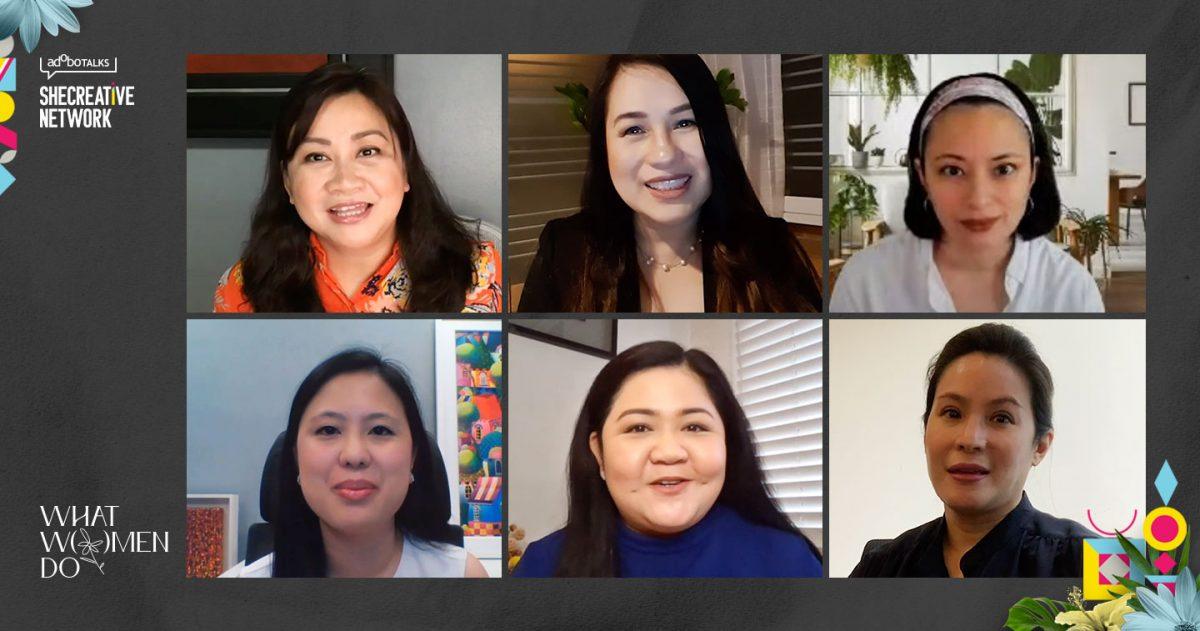MANILA, PHILIPPINES — After the success of the first Virtual Breakfast during Women’s Month in March this year, the adobo SheCreative Network is back with another morning session of “What Women Do: an adobo SheCreative Virtual Breakfast” that has gathered another brilliant panel of women trailblazers who have made their mark in their creative industries.
The adobo SheCreativeNetwork is designed as a platform that celebrates the power and innate talents of women, as well as their ability to create a positive impact on culture, creative industries, business, and communities –– gathering the community and offering opportunities to network, access mentorship and education, as well as business and job creation.
SponsorView this post on Instagram
As its pioneer event, the Virtual Breakfast is meant to shine the spotlight on remarkable women who have emerged as leaders in their respective fields.
More than a year after the pandemic has rocked the country, brands are constantly realizing the need to pick up the pieces and navigate through uncharted territory as the world accepts the imminent reality of the new normal. This period presents an opportunity for businesses and creative enterprises to redefine their purpose –– how they can be of service to an evolving set of consumers in the long run.
With a roundup headed by GCash Mynt President & CEO, Martha Sazon, these creative and tenacious Filipinas –– women entrepreneurs and boardroom executives –– shared their insights with adobo’s founder and editor-in-chief Angel Guerrero on their career stories and how they anchor their brands in these novel times.
Keynote speaker Martha Sazon, a seasoned marketing executive in FMCG, personal care, and telecommunications, shared the unique experience of joining a company and being at its helm in the middle of a lockdown and massive industry disruptions. “Considering that I joined in the middle of a lockdown, I had to learn the ropes of the industry and make decisions all while managing a team whom I had never met face to face”, Martha narrated. While joining a brand and figuring out team dynamics in unusual times was challenging, Martha’s numerous experiences helped her adapt to GCash quickly, steering the fintech brand into how it is known today: a lifeline for Filipinos in lockdown, an extraordinary feat given Filipinos’ initial resistance to financial tech and cashless transactions.
“I remember there were days when I had 11 meetings, even as I figured out how zoom meetings were like most of us”, she shared. “Despite the busy schedule, it has been very fulfilling work because of the impact that GCash has had on people’s lives, especially during this pandemic.”
Martha added, “My journey and learnings has shaped me into a transformational leader that I am now I believe in the power of transformation, which is where the focus on being able to create opportunities for growth by figuring out what the customers really need.”
Jane Bernardo, Marketing Director of Universal Robina Corporation in Thailand talked about challenges, choices, chances, and changes helped build strong brands. In her 20 years of strategic planning and launching business initiatives, Jane has transformed iconic products such as C2 and Nips into well-loved brands that have overcome their own unique challenges and seen success after success. Her knack for turning every challenge into an opportunity has earned her multiple promotions and regional stints, and today, she is now heads the marketing efforts for Universal Robina Corporation in Thailand, the company’s biggest market outside the Philippines.
Jane illustrated numerous real-life experiences of how making certain choices, even risky ones, can truly pay off if one has the courage to see them through. One example of this is the drink brand C2 – after steadily enjoying its status as the market leader of bottled tea brands, the brand had begun to experience a decline in sales while having increased its production capacity. Jane’s team was faced with two options: Either release a new flavor to add to its current lineup, which was an easy modification, or come out with a smaller, affordable size.
Market insights had shown that Filipinos’ daily budget of 10 pesos for a drink was not enough to cover C2, which retailed at 15 pesos at the time. While adding a new and smaller variant would disrupt its current processes given the time and resources to commission a new and customized bottle, the move paid off. After releasing C2 Solo, the brand enjoyed a 24% growth in its first year, later reaping double-digit figures in succeeding years.
“There are two ingredients to becoming successful with any idea”, Jane explains. “It’s really knowing your consumer. Every successful idea that I’ve seen focus on the consumer –– their needs, their aspirations, their pain points, their joy.”
“And lastly, you need courage to see your idea through –– to see its weaknesses, its strengths and its possibilities. It also helps if your organization is made up of courageous leaders who will allow you to challenge conventions, make great choices to take chances, and to create real change.”
Monica Llamas-Garcia, Communications Director of Bleeding Heart Rum Co., the makers of Don Papa Rum, shared her “non-linear” career path – beginning with a stint in McCann Erickson handling client services for Coca-Cola, before pursuing a path in the arts and entertainment as an actress, a TV host, and a commercial model, as well as the marketing and sales director of Ballet Philippines for two years. Monica enjoyed a brief return to corporate through Solar Entertainment’s marketing division, as well as another stint in art as the curator and manager of Bonifacio Global City’s public arts program before her foray into food and beverage with Don Papa Rum, and later on, Three Hens, a local wine brand.
As Communications Director, it was important for Monica to create a singular yet vivid narrative for Don Papa Rum that eschewed traditional notions of a spirit brand. Doing away with the “sexy girls” and the “sexy stories”, the brand turned to the rich history of Negros, “the sugar bowl of the Philippines”, where its premium rum was created from the island’s sugarcane and aged in wooden barrels. Don Papa takes its inspiration from its vast sugarcane fields, its rich agricultural background, as well as its own history – the brand’s name is influenced by historical figure Papa Isio, founder of the Negros Republic.
Monica’s team tapped Clio award-winning design brand Stranger & Stranger, who holds offices in London and New York City, to come up with the brand’s intricate bottle packaging that is taken after Negros’ rich heritage. The concept of reimagining Negros later gave way to “Sugarlandia”, a fictional world that serves as the “spiritual home of Don Papa”, that centers all the brand’s creative, branding, and marketing efforts.
This singular yet organic approach has allowed the brand to tell more vivid stories, create more meaningful collaborations, and foster richer connections. To date, the brand has grown its presence in 30 markets around the world – and it’s a strong affinity among its patrons that have kept Don Papa afloat even in uncertain times. “The creative industry and the food industry really embraced us”, Monica shared, adding that they had strengthened their ties with partner retailers around the world and pursued intimate community events that fostered deeper engagement with its consumers.
Dorothy Dee-Ching, Unilever Philippines’ Vice President for Beauty and Personal Care, touched on the evolution of the beauty industry into a positive force that answers the needs of today’s multifaceted consumers. Instead of peddling a singular standard of beauty that the industry has once been associated with, the presence of women in the boardroom have slowly shaped the culture into one that champions an inclusive, sustainable, and equitable era of beauty.
According to Dorothy, over 50% of young girls have low self-esteem and confidence due to limiting beauty standards and stereotypes, with social media further reinforcing these standards. As these perceptions begin at a young age, Unilever has sought to address these issues and empower more women throughout their different life stages through their respective brands –– as girls, as young women, as mothers, and as working professionals.
“Our purpose is to make universally accessible to every woman a positive experience of beauty, and teaching young girls that beauty should be a source of confidence, not a source of anxiety”, Dorothy said.
In the case of Dove, the brand partnered with Cartoon Network’s Steven Universe in order to send the message of self-love and acceptance. Also valuing the importance of mental health, the brand also struck a partnership with the Girl Scouts of the Philippines, which teaches girls how to their self-esteem and body confidence in the middle of a highly toxic online culture. This campaign reached 1.2 million lives last year.
Meanwhile, Pond’s is set on empowering young women, who want to look good but do not know where to start. Doing away with the intimidating process of beauty and in light of the pandemic, Pond’s thought to provide an expert solution to Filipinas that suited the new normal while making skincare less daunting. Pond’s introduced the Philippines’ first AI powered chatbot that offers free skin analysis that diagnoses pimples, spots, and wrinkles, while recommending the right products customized to one’s skin type. The chatbot is free to access on Shopee, making this feature a whole lot more accessible for Filipinas.
Melissa Henson, Senior Vice President and Chief Marketing of Manulife Philippines, discussed paving the path for women in C-suite positions. “There is an often-quoted McKinsey study that shows businesses with greater gender diversity and greater gender equality actually perform better. I’ve seen this work, and I’ve seen how this has changed over time”, Melissa explained. “I’ve been quite fortunate to work at companies where women have held some of the key leadership positions. And in Manulife, I’ve seen our leadership really focused on ensuring that there’s gender equality across our leadership roles.”
According to Melissa, women representation in Manulife Philippines’ executive committee grew from 20% in 2015 to 50% in just two years. “Since that time, we’ve actually been quite conscious of this goal, and of this aim to make sure that women have equal representation in senior leadership roles in our company.”
Melissa adds that mentorship and sponsorship are key to widening the path for more women to earn seats at the table. The Manulife exec elaborated, “These are really important in the corporate world, most especially for women. I myself am a product of mentorship and sponsorship. Throughout my career, my mentors have been there to help me navigate complex organizations, they’ve challenged me and push me to raise my hand for new challenges or stretch assignments. My sponsors have made sure that their spotlight’s on me that doors are open for me, and that I get a chance at opportunities which have really shaped my career.”
Manulife’s Senior Vice President further reflected that courage to try the unfamiliar is essential to success. “As I do my work in Manulife today, I find myself challenging a lot of the status quo and asking people around me if we can do things differently. But I’ve found also that it’s important to break out of that comfort zone, so that we can learn and experience new things, and we can grow both personally and professionally.”
That said, aspiring leaders need to embrace the risk of failure that comes with having courage. “That’s the only way we can do things differently, and open new doors for ourselves and for the businesses that we are part of. But part of being brave part of being courageous is accepting that not everything will work out, but dusting ourselves off picking up. And just learning from that experience so we can do better next time.”
To this day, Melissa continues to have a glass-half-full mindset, The other thing I’ve learned is that we are students forever. continuous learning is key because the world is changing so quickly, the context in which we do business, the context in which we lead, as women leaders and as leaders in general changes every day. So we need to learn continuously, we need to learn from each other. We need to learn from other industries, we need to keep abreast of all of the things that are changing around us. So we can find new ways to deliver solutions to the customers that we serve. And the last thing, which is also what I’d like to leave everyone with as we empower each other. I mentioned earlier that I am the product of mentorship and sponsorship and really, my career is what it is today because of a lot of help and coaching and mentoring that I receive from leaders that I have encountered throughout my career. And at this point, I think it’s time to pay it forward. So I continue to mentor both within my team and beyond my team emerging leaders in our organization, even former colleagues from my past roles, and what I found in what I’ve learned is that we actually learn from each other and as I spend time with them, I learned from them as well and really when we share of ourselves and of our time generously, we are able to lift each other up and we are able to grow together.
Ana Lorenzana de Ocampo, CEO and President of Wildflour Bakery + Café Corp., is the mastermind behind well-loved brunch bistro Wildflour, as well as other brands that have marked the country’s dining scene, including Pink’s Manila. The pastry chef and restaurateur shared Wildflour’s beginnings – how it had sustained multiple rejections from malls before the NEO Group took a chance on her idea –– a brunch café that offered good food to professionals within the central business district –– and gave birth to the first Wildflour branch.
Opening the restaurant with sister Margarita Manzke and Walter Manzke, both highly acclaimed chefs of Rèpublique in Los Angeles, Ana was at the helm of the business since day one. “It has always been important to me that for my business, the focus has to always be on the quality of the food, service and overall experience we provide our customers. Our guiding principle has always been to create things that are simple, but done excellently, and to be able to bring a different dining experience to Manila.”
It was through Ana’s steely leadership and firm hand that Wildflour was able to sustain its growth even in the midst of uncertainty as the COVID-19 pandemic struck and ushered various changes to the restaurant group’s operational footprint. “All of our brands and stores were growing exponentially prior to COVID-19. We were forced to rethink the way we work and operate our business, and needed to immediately address the two primary considerations necessary for us to stay afloat: one, how to continue serving the customers where they are without a dine-in option; two, how to ensure the health and safety of our employees, customers and products despite the risk of the spread of the virus.”
It was Ana’s foresight and problem-solving skills that had kept them ahead. “Thankfully, we already had a headstart that allowed us to pivot quickly the last two months prior to the pandemic –– we had already begun developing our own in-house delivery platform, Wildflour To-Go, a simple Instagram shop to handle the bulk pre-orders of cakes and pastries which could not be serviced by third party delivery platforms.”
Ana added, “We could have not predicted just how crucial this initiative will turn out to be for us since we also had no inkling how impactful this would be, and ended up as what was able to tie the business throughout the initial lockdown. While many other restaurants had to cease operations and only begin to work on their delivery channels to supplement the third parties upon lockdown, Wildflour was able to continue operating without any breaks despite everything.”
From initially servicing BGC and Makati areas, Wildflour To-Go eventually expanded its delivery reach to the entire Metro Manila area, as well as nearby provinces. Branches were converted as cloud kitchens to fully support delivery and takeout orders, opening sub-brands such as Wildflour Italian, Wildflour Rotisserie, and Wildflour Pizza to offer more delivery options.
Even as quarantine protocols relaxed and dine-in options were made available again, Wildflour successfully incorporated the new Wildflour To-Go system as part of their regular business operations, catering to a wider range of consumers who prefer the ease and security that come with dining in their homes. “We foresee [Wildflour To-Go] to continue to be important to the company into the post-pandemic reality – while many will revert to their old habits of dining at their favorite restaurant, some people will prefer to continue enjoy from the comfort of their homes instead – as a result, we are now able to cater to consumer behaviors of all types.”
For more updates, follow adobo magazine and the adobo SheCreative Network on Facebook, and sign up to be a part of the adobo Creative Network here.








